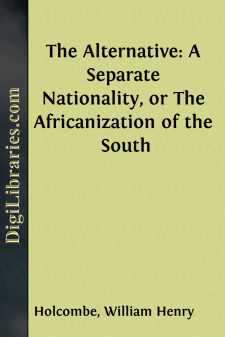Categories
- Antiques & Collectibles 13
- Architecture 36
- Art 48
- Bibles 22
- Biography & Autobiography 813
- Body, Mind & Spirit 142
- Business & Economics 28
- Children's Books 17
- Children's Fiction 14
- Computers 4
- Cooking 94
- Crafts & Hobbies 4
- Drama 346
- Education 46
- Family & Relationships 57
- Fiction 11829
- Games 19
- Gardening 17
- Health & Fitness 34
- History 1377
- House & Home 1
- Humor 147
- Juvenile Fiction 1873
- Juvenile Nonfiction 202
- Language Arts & Disciplines 88
- Law 16
- Literary Collections 686
- Literary Criticism 179
- Mathematics 13
- Medical 41
- Music 40
- Nature 179
- Non-Classifiable 1768
- Performing Arts 7
- Periodicals 1453
- Philosophy 64
- Photography 2
- Poetry 896
- Political Science 203
- Psychology 42
- Reference 154
- Religion 513
- Science 126
- Self-Help 84
- Social Science 81
- Sports & Recreation 34
- Study Aids 3
- Technology & Engineering 59
- Transportation 23
- Travel 463
- True Crime 29
The Alternative: A Separate Nationality, or The Africanization of the South
Description:
Excerpt
A sectional party, inimical to our institutions, and odious to our people, is about taking possession of the Federal Government. The seed sown by the early Abolitionists has yielded a luxurious harvest. When Lincoln is in place, Garrison will be in power. The Constitution, either openly violated or emasculated of its true meaning and spirit by the subtleties of New England logic, is powerless for protection. We are no longer partners to a federal compact, but the victims of a consolidated despotism. Opposition to slavery, to its existence, its extension and its perpetuation, is the sole cohesive element of the triumphant faction. It did not receive the countenance of a single vote in any one of the ten great cotton States of the South! The question is at length plainly presented: submission or secession. The only alternative left us is this: a separate nationality or the Africanization of the South.
He has not analyzed this subject aright nor probed it to the bottom, who supposes that the real quarrel between the North and the South is about the Territories, or the decision of the Supreme Court, or even the Constitution itself; and that, consequently, the issues may be stayed and the dangers arrested by the drawing of new lines and the signing of new compacts. The division is broader and deeper and more incurable than this. The antagonism is fundamental and ineradicable. The true secret of it lies in the total reversion of public opinion which has occured in both sections of the country in the last quarter of a century on the subject of slavery.
It has not been more than twenty-five years since Garrison was dragged through the streets of Boston with a rope around his neck, for uttering Abolition sentiments; and not thirty years since, the abolition of slavery was seriously debated in the Legislature of Virginia. Now, on the contrary, the radical opinions of Sumner, Emerson and Parker, and the assassination schemes of John Brown, are applauded in Fanueil Hall, and the whole Southern mind with an unparalelled unanimity, regards the institution of slavery as righteous and just, ordained of God, and to be perpetuated by man. We do not propose to analyze the causes of this remarkable revolution, which will constitute one of the strangest chapters of history. The fact is unquestionable. To understand rationally the events which are transpiring, and to forsee their inevitable issue, it is necessary to examine this element of discord between the Northern and Southern people, to investigate its true nature and extent, and weigh carefully the prospect of its cure.
The Northern mind has become thoroughly anti-slavery in sentiment. Even those who contend for our constitutional rights share in the universal opinion that slavery is a great moral and social evil. Those who have adopted the pro-slavery view are exceedingly few in numbers, and are regarded by the mass of Northern people as more fanatical than the most extreme Abolitionist. The press, the pulpit, the rostrum of the North are clamorous with declamation against us and our institutions. Slavery is considered not only immoral but debasing to both owner and owned. It is, they say, a relic of barbarism and a disgrace to an enlightened people. We are not regarded as equals but are merely tolerated, as persons whom they in their wisdom may possibly reform and improve. Churches refuse us participation in religious rites, and a baleful element of religious hate adds fuel to the fire of political dissension. From present appearances, the North will before very long be unanimous in opinion, and if it has the power or can invent the means, it will be ready to reduce the South to the condition of Hayti and Jamaica, and expect the approval of God upon the atrocity.
It is unquestionably true, although it be upon false issues, that the sympathies of the civilized world are united against us. The name of slavery is hateful to the ears of freemen and of those who desire to be free....


